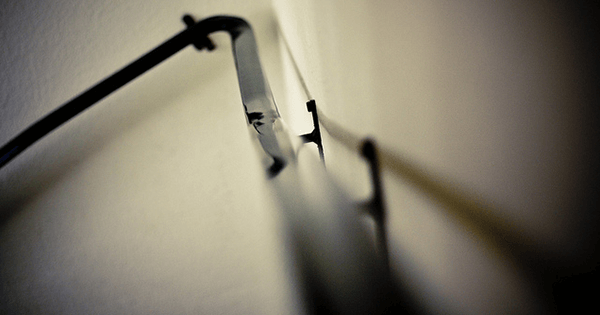
When I wake up each morning and go downstairs to feed the cats and get the newspaper from the stoop, I hold on to the banister. I take the steps one at a time, with both feet on each step, because my knees are stiff when I wake up and I feel a slight pressure or pain if I try to take two steps at a time. I often notice that while I am still in bed, I am prone to pulling a muscle or getting a charley horse—which never happened to me when I was young, not that I remember. Sometimes when I feel my leg muscle start to cramp up, I can halt it just in time by changing positions. All this makes me rather gingerly descend the stairs. Sometimes I catch myself thinking about Primo Levi and his fatal tumble: Was it suicide or an accident? The scholars are still debating. In any case, I hold on tight to the banister in the event of my foot sliding unevenly.
None of this is new: I have always been physically cautious. I remember when I was 14 and a camp counselor, I walked very slowly and tentatively around the edge of the swimming pool, lest I fall in, little realizing that the head of the camp, Gloria, was watching me from her cabin window, and she, something of a sadist, would go on to expose my timidity to all the other counselors in a group meeting, as proof, I suppose, that I was lacking in manliness or courage. I fought her Stalinist authoritarian ways every chance I could, but this time I was silenced, as it seemed even strange to me that I had been so timorous in circumnavigating that pool. I would like to think that I was caught in a literary reverie, and that that was why I was proceeding so languorously, or that I was testing myself to see just how slowly I could traverse the rectangle. But it was probably just that I was frightened of the physical world.
When my daughter Lily was young, we safety-proofed the whole house, as parents do, putting little metal gates across the top of each flight of stairs. But in time we realized that they were unnecessary, because she invariably held on to the banister, as we had instructed her. She too was physically cautious: she had inherited my DNA and would avoid tangling in soccer skirmishes in gym class, instead cheering the others on. How I sympathized with her, while wishing she could have taken after her intrepid mom, who is far more at home in the challenge of objects and nature.
I remember the few times I played football as a child, ending up at the bottom of a pile of bodies, wondering if they would ever get off me or if I would have to suffocate. I was not hated, not scapegoated as a child, but neither was I so popular that I could count automatically on the pity of my classmates while gasping for breath. I was also frightened of dogs, after one had pounced on me and tried to bite me. The entire physical world seemed a minefield; and so it has remained, to some extent. I feel much more comfortable, as well as much more daring, living in my head. My clumsiness has always been an effort to forestall some sudden spill. Hence, as I get older, I will continue to hold on to banisters (my wife being my principal banister), just to be on the safe side.

